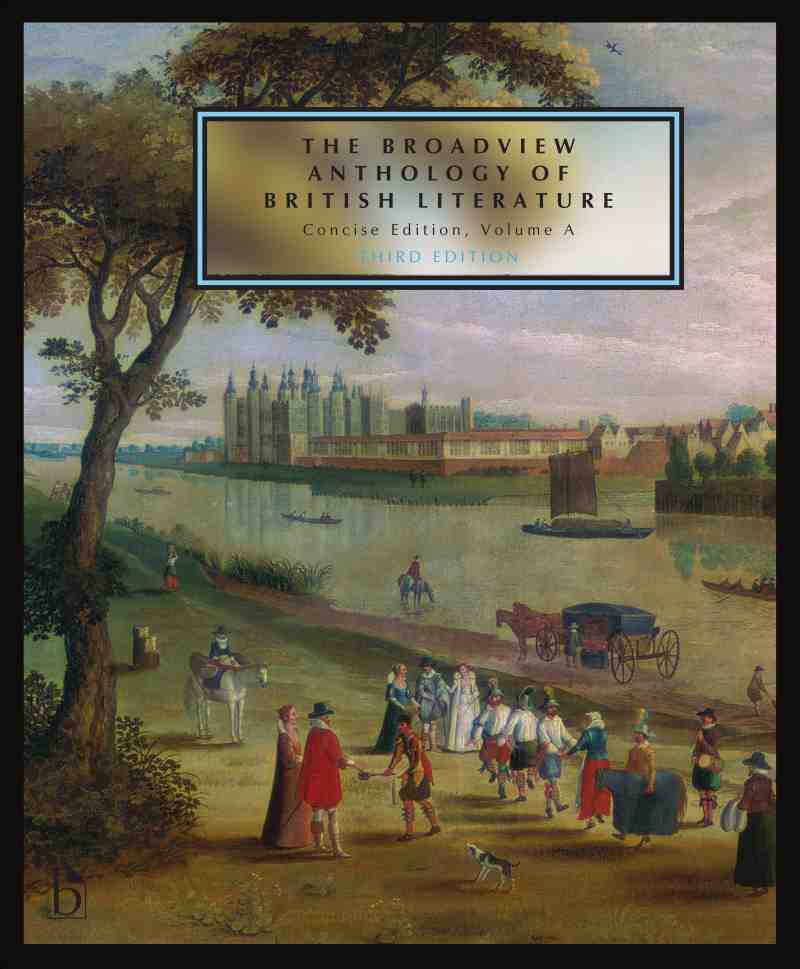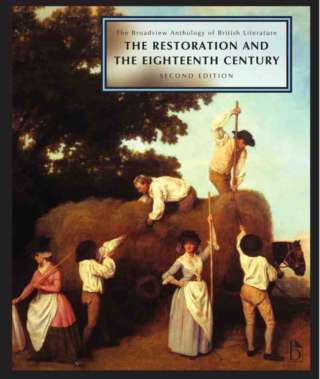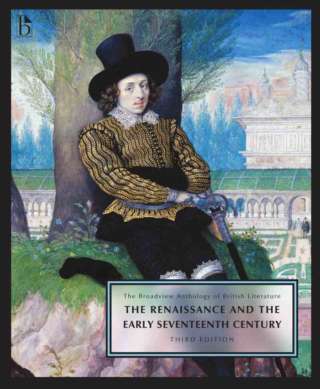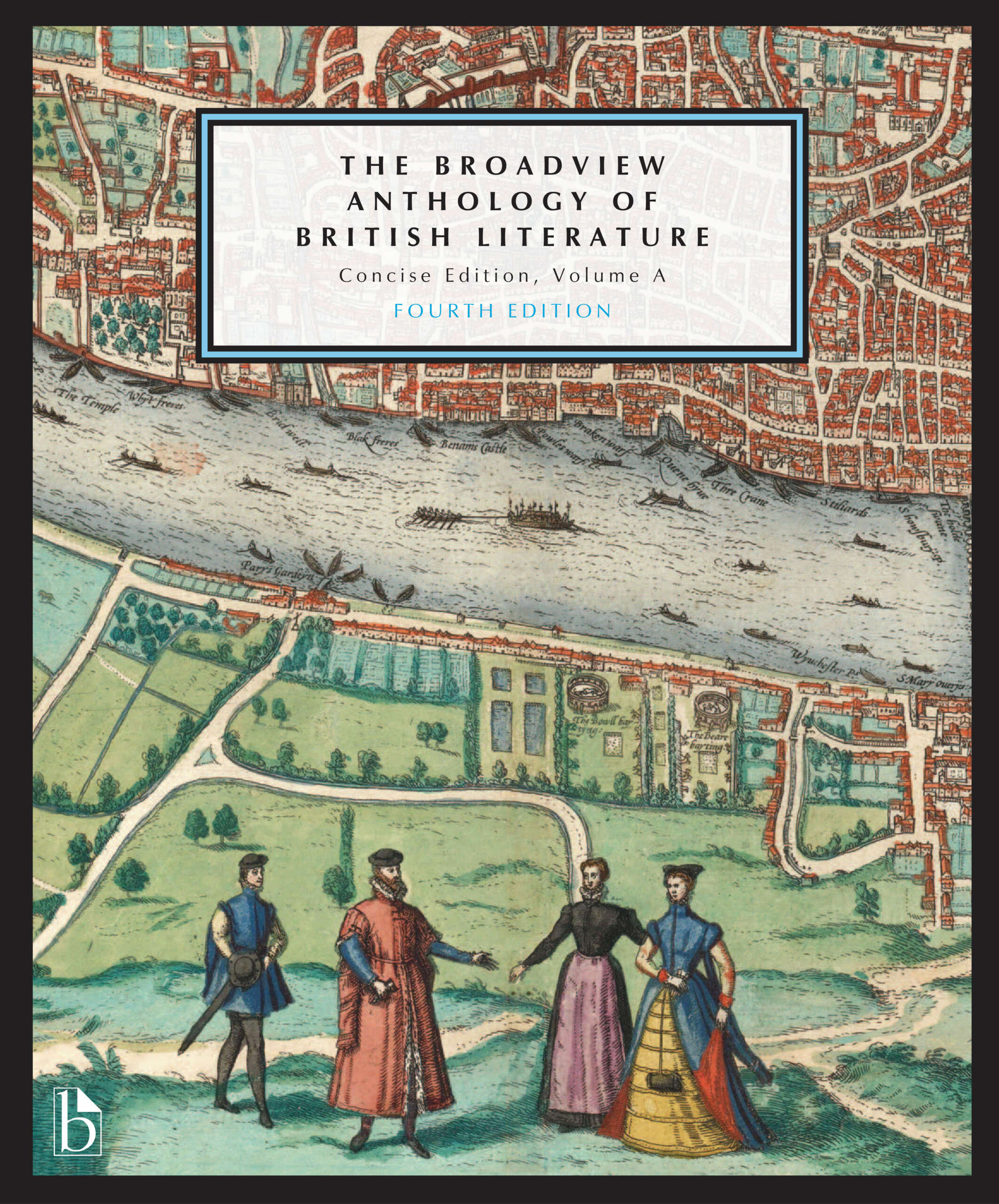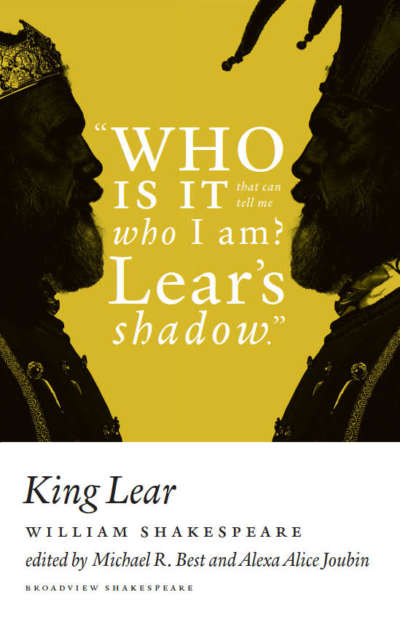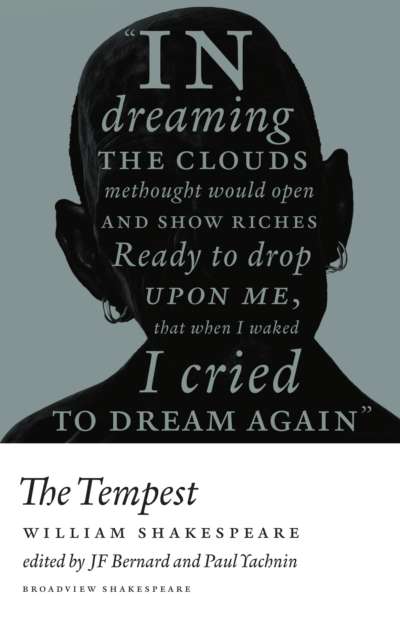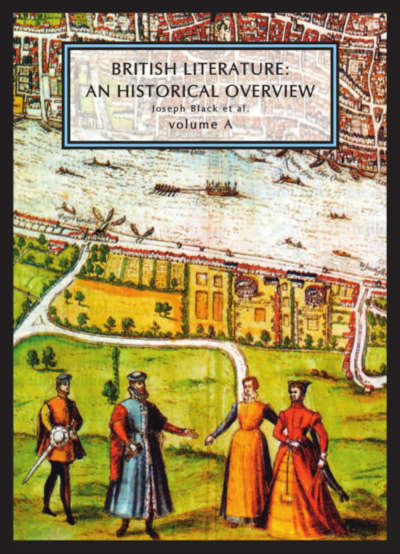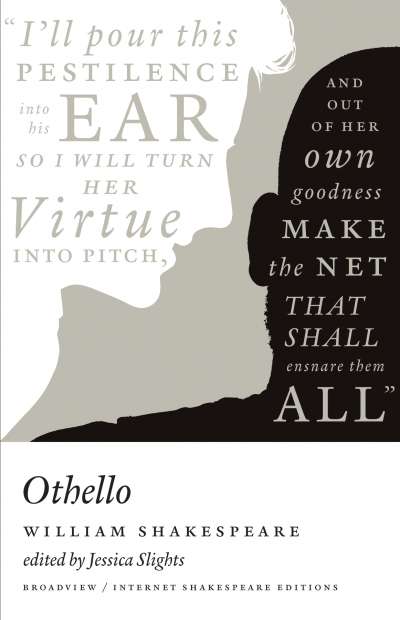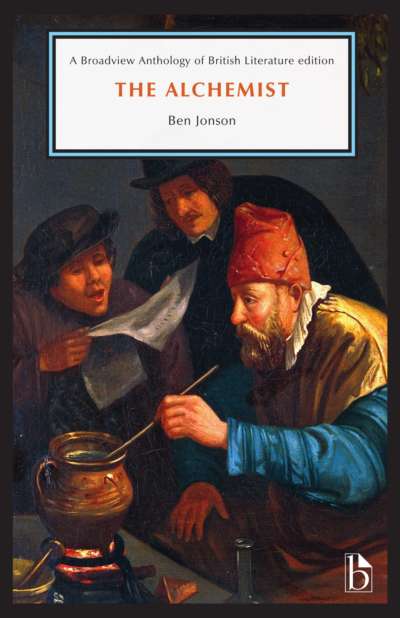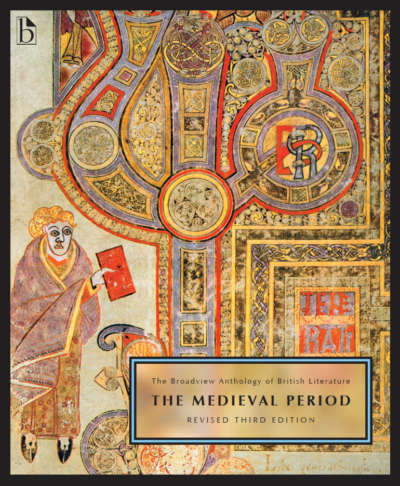In all six of its volumes The Broadview Anthology of British Literature presents British literature in a truly distinctive light. Fully grounded in sound literary and historical scholarship, the anthology takes a fresh approach to many canonical authors, and includes a wide selection of work by lesser-known writers. The anthology also provides wide-ranging coverage of the worldwide connections of British literature, and it pays attention throughout to issues of race, gender, class, and sexual orientation. It includes comprehensive introductions to each period, providing in each case an overview of the historical and cultural as well as the literary background. It features accessible and engaging headnotes for all authors, extensive explanatory annotations, and an unparalleled number of illustrations and contextual materials. Innovative, authoritative and comprehensive, The Broadview Anthology of British Literature has established itself as a leader in the field.
The full anthology comprises six bound volumes, together with an extensive website component; the latter has been edited, annotated, and designed according to the same high standards as the bound book component of the anthology, and is accessible by using the passcode obtained with the purchase of one or more of the bound volumes.
The two-volume Broadview Anthology of British Literature, Concise Edition provides an attractive alternative to the full six-volume anthology. Though much more compact, the concise edition nevertheless provides instructors with substantial choice, offering both a strong selection of canonical authors and a sampling of lesser-known works. With an unparalleled number of illustrations and contextual materials, accessible and engaging introductions, and full explanatory annotations, the concise edition of this acclaimed Broadview anthology provides focused yet wide-ranging coverage for British literature survey courses.
Among the works now included for the first time in the concise edition are Chaucer’s The Prioress’s Tale; the York Crucifixion play; more poems from Sidney’s Astrophil and Stella; an expanded section of writings by Elizabeth I, more poems by Lady Mary Wroth, and an expanded selection of work by Margaret Cavendish. The literatures of Ireland, Gaelic Scotland, and Wales are now much better represented, and a selection of work by Laboring Class Poets is now included. There are also new contextual materials—including a substantial section on “Transatlantic Currents.”
In the case of several authors and texts (among them The Four Branches of the Mabinogi, Julian of Norwich, Sir Thomas Malory, and Phillis Wheatley), the new edition will incorporate substantial improvements that have been made in the new editions of the period volumes published in recent years.
As before, the Concise edition includes a substantial website component, providing instructors with a great degree of flexibility. For the first time, a selection of Chaucer’s Canterbury Tales will be available online in facing-column format (with versions in modern English included opposite the original text).
Comments
Praise for the Broadview Anthology of British Literature, Concise
“I am pleased to say that my students and I really enjoyed using The Broadview Anthology of British Literature, Concise Edition this past fall and spring semesters in my survey of British literature. … The final average of my spring survey class was one of the highest in my teaching career, and I am sure that the Broadview anthology was one of the many reasons for this excellent performance. My students were also excited about the Broadview editions of Frankenstein and Tess of the D’Urbervilles that we used.” — Richard Branyon, Eastern Connecticut University
Comments on The Broadview Anthology of British Literature:
“After twenty years of teaching British literature from the Norton anthologies, I’m ready to switch to the Broadview. The introductions to each period are key to teaching a survey course, and those in the Broadview seem to me to be both more accessible to students and more detailed in their portraits of each era than are those of the Norton. And Broadview’s selection of authors and texts includes everything I like to teach from the Norton, plus a good deal else that’s of real interest.” — Neil R. Davison, Oregon State University
“ … sets a new standard by which all other anthologies of British literature will now have to be measured.” — Graham Hammill, University at Buffalo, The State University of New York
“With the publication of the Broadview Anthology of British Literature, teachers and students in survey and upper-level undergraduate courses have a compelling alternative to the established anthologies by Norton and Longman. … This is a very real intellectual, as well as pedagogical, achievement.” — Nicholas Watson, Harvard University
“ … an excellent anthology. Good selections for my purposes (including some nice surprises), just the right level of annotation, affordable—and a hit with my students. I will definitely use it again.” — Ira Nadel, University of British Columbia
“… I have been using The Broadview Anthology of British Literature for three years now. I love it—and so do my students!” — Martha Stoddard-Holmes, University of California, San Marcos
“Norton’s intros are good; Broadview’s are better, with greater clarity and comprehension, as well as emphasis upon how the language and literature develop, both reacting or responding to and influencing or modifying the cultural, religious/philosophical, political, and socio-economic developments of Britain. The historian and the linguist in me thoroughly enjoyed the flow and word-craftsmanship. If you have not considered the anthology for your courses, I recommend that you do so.” — Robert J. Schmidt, Tarrant County College
For a PDF of the table of contents, click here.
NOTE: The online component of the anthology offers a substantial number of additional readings, edited to the same standards as the bound book. Online readings appear in the hyperlinked sections below; to download these readings, please follow the hyperlinks to the BABL online resources site and log in using your passcode.
Preface
Acknowledgments
THE MEDIEVAL PERIOD
- Errata Slip – on the use of “Anglo-Saxon” (website)
- INTRODUCTION TO THE MEDIEVAL PERIOD
- History, Narrative, Culture
Before the Norman Conquest
- Celts in Medieval Britain and Ireland
Roman Britain
Early Anglo-Saxon Britain
Celtic Culture
Celtic Christianity
Later Anglo-Saxon Britain
Invasion and Unification
- After the Norman Conquest
- The Normans and Feudalism
Henry II and an International Culture
Wales, Scotland, Ireland: Norman Invasions and Their Aftermath
The Thirteenth Century
The English Monarchy
Cultural Expression in the Fourteenth Century
Fifteenth-Century Transitions
Language and Prosody
- HISTORY OF THE LANGUAGE AND OF PRINT AND MANUSCRIPT CULTURE
- BEDE
- from Ecclesiastical History of the English People
- A Description of the Island of Britain and Its Inhabitants
The Coming of the English to Britain
The Life and Conversion of Edwin, King of Northumbria; the Faith of
the East Angles
Abbess Hild of Whitby; the Miraculous Poet Cædmon
Cædmon’s Hymn in Old and Modern English
- EARLY IRISH LYRICS
- The First Satire
[A Bé Find, in rega lim] Fair Lady, will you go with me
[Messe ocus Pangur Bán] Me and white Pangur
[Is acher in gáith innocht] The wind is wild tonight
[Techt do Róim] Going to Rome?
The Lament of the Old Woman of Beare
- EXETER BOOK ELEGIES
- The Wanderer
The Seafarer
The Wife’s Lament
The Ruin
- EXETER BOOK RIDDLES
- Riddle 1
Riddle 2
Riddle 3
Riddle 7
Riddle 14
Riddle 26
Riddle 43
Riddle 44
Riddle 45
Riddle 47
Riddle 85
Riddle 86
Riddle 95
- BEOWULF
- IN CONTEXT: Background Material
- Glossary of Proper Names
Genealogies
The Geatish-Swedish Wars
- GEOFFREY OF MONMOUTH
- from A History of the Kings of Britain
- THE FOUR BRANCHES OF THE MABINOGI
- MARIE DE FRANCE
- Bisclavret (The Werewolf)
Lanval
- MIDDLE ENGLISH LYRICS
- Sumer is icumen in
Foweles in the frith
Betwene Mersh and Averil
Stond well, moder, under Rode
I lovede a child of this cuntree
I have a gentil cock
I sing of a maiden
Adam lay ibounden
Farewell this world, I take my leve forever
Bring us in good ale
Of all creatures women be best
My lefe is faren in a lond
- CONTEXTS: THE CRISES OF THE FOURTEENTH CENTURY
- The Great Famine
- from Anonymous (the “Monk of Malmesbury”), Life of Edward the Second
- The Hundred Years’ War
- from Jean Froissart, Chronicles
from Prince Edward, Letter to the People of London
- The Black Death
- from Ralph of Shrewsbury, Letter, 17 August 1348
from Henry Knighton, Chronicle
- The Uprising of 1381
- from Regulations, London (1350)
from Statute of Laborers (1351)
from Statute (1363)
from Jean Froissart, Chronicles, Account of a Sermon by John Ball
John Ball, Letter to the Common People of Essex, 1381
from Henry Knighton, Chronicle (additional selections on sites.broadviewpress.com/bablonline)
- SIR GAWAIN AND THE GREEN KNIGHT
- IN CONTEXT:Illustrations from the Original Manuscript
IN CONTEXT:The Thorn and the Yogh
- GEOFFREY CHAUCER
- To Rosemounde
from The Canterbury Tales
- The General Prologue
The Knight’s Tale (sites.broadviewpress.com/bablonline)
The Miller’s Prologue and Tale
The Wife of Bath’s Prologue and Tale
The Pardoner’s Prologue and Tale
The Prioress’s Prologue and Tale
The Nun’s Priest’s Prologue and Tale
Chaucer’s Retraction
Complaint of Chaucer to His Purse
- JULIAN OF NORWICH
- from A Vision Shown to a Devout Woman
- Section 1
Section 2
Section 3
Section 4
Section 10
Section 11
Section 12
Section 13
- from A Revelation of Love
- MARGERY KEMPE
- from The Book of Margery Kempe
- The Proem
The Preface
from Book 1
- Chapter 1
Chapter 2
Chapter 3
from Chapter 4
from Chapter 11
Chapter 50
Chapter 52
Chapter 53
Chapter 54
Chapter 55
- CONTEXTS: RELIGIOUS AND SPIRITUAL LIFE
- Celtic Christianity
Church and Cathedral
Religion for All: The Apostle’s Creed, the Pater Noster, and the Hail Mary
- from Robert Manning of Brunne, Handlyng Synne
from William of Pagula, Priest’s Eye
from The Canons of the Fourth Lateran Council
- Sin, Corruption, and Indulgence
- from William Langland, Piers Plowman (B-text)
- from Passus 1
from Passus 5
from Passus 7
- from Thomas Wimbleton, Sermon
- Lollardy
- from Account of the Heresy Trial of Margery Baxter
- The Persecution of the Jews
- from Thomas of Monmouth, The Life and Miracles of St. William of Norwich
from Roger Howden, Chronicle
from The Ordinances of the Jews
from The Charter of King John to the Jews
from The Ordinances of Henry III
Edward I’s Order
- THE WAKEFIELD MASTER
- The Second Shepherds’ Play
IN CONTEXT: Biblical Source Material
- from Douay-Rheims Bible, Luke 2.8–21
- SIR THOMAS MALORY
- from Morte Darthur
- IN CONTEXT: Early Editions of Morte Darthur
- Caxton’s Preface
Illustrating Morte Darthur
THE RENAISSANCE AND THE EARLY SEVENTEENTH CENTURY
- THE RENAISSANCE AND THE EARLY SEVENTEENTH CENTURY
- Humanism
Scientific Inquiry
The Reformation in England
Wales, Scotland, Ireland
Edward VI, Mary I, and Elizabeth I
Elizabeth I and Gender
Homoeroticism and Cross-Dressing
Economy and Society in the Sixteenth and Seventeenth Centuries
“The Round Earth’s Imagined Corners”
The Stuarts and the Civil Wars
Literary Genres
Literature in Prose and the Development of Print Culture
Poetry
The Drama
The English Language in the Sixteenth and Seventeenth Centuries
- HISTORY OF THE LANGUAGE AND OF PRINT CULTURE
- SIR THOMAS MORE (sites.broadviewpress.com/bablonline)
(Also available as a stand-alone volume)
- from Utopia: The Best State of a Commonwealth and the New Island of Utopia
- from Book 1
from Book 2
- Chapter 1
from Chapter 2: The Cities, and Especially Amaurote
from Chapter 4: Crafts and Occupations
from Chapter 5: Their Dealings With One Another
from Chapter 6: Traveling
from Chapter 7: Slavery
from Chapter 8: Warfare
from Chapter 9: The Religions in Utopia
- WILLIAM TYNDALE
- Tyndale’s English Bible, King James Bible, Geneva Bible, Douay-Rheims Bible
- Genesis: Chapter 1
Matthew: Chapter 5
- SIR THOMAS WYATT
- Sonnets
- 10 (“The long love that in my thought doth harbour”)
29 (“The pillar perished is whereto I leant”)
31 (“Farewell, Love, and all thy laws forever”)
- Epigrams
- 38 (“Alas, madam, for stealing of a kiss”)
48 (“Vulcan begat me; Minerva me taught”)
60 (“Tagus, farewell, that westward with thy streams”)
- Ballads
- 80 (“They flee from me that sometime did me seek”)
94 (“Blame not my lute, for he must sound”)
- Songs
- 109 (“My lute, awake! Perform the last”)
123 (“Who list his wealth and ease retain”)
- Epistolary Satires
- 149 (“Mine own John Poyns, since ye delight to know”)
- IN CONTEXT: Epistolary Advice
- HENRY HOWARD, EARL OF SURREY
- Love, that Doth Reign and Live within My Thought
Set Me Whereas the Sun Doth Parch the Green
Alas! So All Things Now Do Hold Their Peace
So Cruel Prison How Could Betide
Wyatt Resteth Here
from Certain Books of Virgil’s Aeneis: Book 2
- THE ELIZABETHAN SONNET AND LYRIC
- The Continental Background
- Francesco Petrarch
- from Rime Sparse
- 134 (“Pace non trovo et non ò da far guerra”)
134 (“I find no peace and all my war is done”)
140 (“Amor, che nel penser mio vive et regna”)
140 (“Love, that doth reign and live within my thought”)
189 (“Passa la nave mia colma d’oblio”)
189 (“My galley chargèd with forgetfulness”)
190 (“Una candida cerva sopra l’erba”)
190 (“Whoso list to hunt, I know where is a hind”)
- Gaspara Stampa
- 132 (“Quando io dimando nel mio pianto Amore”)
132 (“When in my weeping I inquire of Love”)
- Joachim Du Bellay
- from L’Olive augmentée
- 113 (“Si nostre vie est moins qu’une journée”)
113 (“If this, our life, be less than but a day”)
- from Les Regrets
31 (“Heureux qui, comme Ulysse, a fait un beau voyage”)
31 (“Blest he who like Ulysses voyaged fair and wide”)
- Pierre de Ronsard
- (“Je vouldroy bien richement jaunissant”)
(“I would in rich and golden coloured rain”)
(“Quand vous serez bien vielle, au soir à la chandelle”)
(“When you are very old, by candle’s flame”)
- Anne Lock
- from A Meditation of a Penitent Sinner
- (“Long have I heard, and yet I hear the sounds”)
(“Look on me, Lord: though trembling I beknowe”)
- Samuel Daniel
- from Delia
- 6 (“Fair is my love, and cruel as she’s fair”)
28 (“Raising my hopes on hills of high desire”)
33 (“When men shall find thy flower, thy glory pass”)
- Michael Drayton
- from Idea
- 6 (“How many paltry, foolish, painted things”)
61 (“Since there’s no help, come let us kiss and part”)
63 (“Truce, gentle Love, a parley now I crave”)
- William Shakespeare
- from Romeo and Juliet (Act 1, Scene 5)
- Sir John Davies
- from Gulling Sonnets
- 3 (“What eagle can behold her sun-bright eye”)
- John Davies of Hereford
- from The Scourge of Villany
- (“If there were, oh! an Hellespont of cream”)
- Richard Barnfield
- from Cynthia
- 14 (“Here, hold this glove (this milk-white cheverel glove)”)
17 (“Cherry-lipped Adonis in his snowy shape”)
- George Gascoigne
- Anonymous
- Ode (“Absence, hear thou my protestation”)
- LITERATURE IN IRELAND, SCOTLAND, AND WALES
- Ireland and Scotland
- Gofraidh Fionn Ó Dálaigh
- Isabel, Countess of Argyll
- There’s a young man in pursuit of me / Atá fleasgach ar mo thí
Woe to the one whose sickness is love / Is mairg dá ngalar an grádh
Woe to the one whose sickness is love (alternative translation)
- Anonymous
- Lament for MacGregor of Glenstrae, who was beheaded in 1570
- Tadhg Dall Ó hUiginn
- from “The Battle of Drumleene”
Enniskillen
A Satire
- Geoffrey Keating
- O Woman Full of Wiles
Bear with Thee, O Letter, My Blessing
On the Miseries of Ireland
from History of Ireland
- Dáibhí Ó Bruadair
- Gone Are All the Noble Poets
After the Death of the Poets
- Geoffrey O’Donoghue of the Glens
- This caps all their tricks, this statute from overseas
- Aodhagán Ó Rathaille
- The Ruin that Befell the Great Families of Ireland
- Lady Anne Lindsay
- IN CONTEXT: English Invasions of Ireland (sites.broadviewpress.com/bablonline)
- from Edmund Spenser, A View of The Present State of Ireland
from Oliver Cromwell, Letter to the English Parliament (17 September 1649)
from Father Thomas Quinn, Letter to the Vatican (28 August, 1656)
- Wales
- Dafydd ap Gwilym
- The Skylark
The Gull
Trouble at an Inn
Morfudd Like the Sun
The Mirror
The Ruin
The Poet and the Grey Friar
- Tudur Penyllyn
- Conversation between a Welshman and an Englishwoman / Ymddiddan Rhwyng Cymro a Saesnes
- Gwerful Mechain
- Elis Gruffydd
- Siôn Cent
- from The Illusion of the World / Hud a Lliw y Byd
- EDMUND SPENSER
- from The Faerie Queene
- Letter to Sir Walter Ralegh on The Faerie Queene
IN CONTEXT: The Redcrosse Knight (Illustration)
IN CONTEXT: Christian Armor
- from Paul’s Epistle to the Ephesians, 6.11–17 (Geneva Bible)
from Desiderius Erasmus, Enchiridion militis Christiani [Handbook of the Christian Soldier]
- IN CONTEXT: Spirituality and The Faerie Queene
- Heading to the Song of Solomon (Geneva Bible)
- from Amoretti
- 1 (“Happy ye leaves when as those lilly hands”)
3 (“The soverayne beauty which I doo admyre”)
6 (“Be nought dismayd that her unmovèd mind”)
15 (“Ye tradefull Merchants, that with weary toyle”)
22 (“This holy season fit to fast and pray”)
26 (“Sweet is the Rose, but growes upon a brere”)
34 (“Lyke as a ship that through the Ocean wyde”)
37 (“What guyle is this, that those her golden tresses”)
54 (“Of this worlds Theatre in which we stay”)
64 (“Comming to kisse her lyps, (such grace I found)”)
67 (“Lyke as a hunstman after weary chace”)
68 (“Most glorious Lord of lyfe that on this day”)
69 (“The famous warriors of the anticke world”)
70 (“Fresh spring the herald of loves mighty king”)
74 (“Most happy letters fram’d by skilfull trade”)
75 (“One day I wrote her name upon the strand”)
80 (“After so long a race as I have run”)
82 (“Joy of my life, full oft for loving you”)
89 (“Lyke as the Culver on the barèd bough”)
- Epithalamion (sites.broadviewpress.com/bablonline)
- SIR PHILIP SIDNEY
- from Astrophil and Stella
- 1 (“Loving in truth, and fain in verse my love to show”)
2 (“Not at first sight, nor with a dribbèd shot”)
7 (“When Nature made her chief work, Stella’s eyes”)
18 (“With what sharp checks I in myself am shent”)
20 (“Fly, fly, my friends, I have my death wound; fly!”)
21 (“Your words, my friend, (right healthful caustics) blame”)
22 (“In highest way of heav’n the Sun did ride”)
23 (“The curious wits seeing dull pensiveness”)
24 (“Rich fools there be, whose base and filthy heart”)
25 (“The wisest scholar of the wight most wise”)
26 (“Though dusty wits dare scorn astrology”)
27 (“Because I oft in dark abstracted guise”)
31 (“With how sad steps, Oh Moon, thou climb’st the skies”)
34 (“Come, let me write. ‘And to what end?’ To ease”)
39 (“Come, Sleep! O Sleep, the certain knot of peace”)
41 (“Having this day my horse, my hand, my lance”)
45 (“Stella oft sees the very face of woe”)
47 (“What, have I thus betrayed my liberty?”)
48 (“Soul’s joy, bend not those morning stars from me”)
49 (“I on my horse, and Love on me doth try”)
50 (“Stella, the fullness of my thoughts of thee”)
51 (“Pardon mine ears, both I and they do pray”)
52 (“A strife is grown between Virtue and Love”)
53 (“In marital sports I have my cunning tried”)
54 (“Because I breathe not love to every one”)
55 (“Muses, I oft invoked your holy aid”)
61 (“Oft with true sighs, oft with uncallèd tears”)
69 (“O joy too high for my low style to show!”)
71 (“Who will in fairest book of Nature know”)
94 (“Grief find the words, for thou hast made my brain”)
95 (“Yet Sighs, dear Sighs, indeed true friends you are”)
96 (“Thought, with good cause thou lik’st so well the Night”)
97 (“Dian, that fain would cheer her friend the Night”)
98 (“Ah bed, the field where joy’s peace some do see”)
99 (“When far-spent night persuades each mortal eye”)
100 (“Oh tears, no tears, but rain from Beauty’s skies”)
101 (“Stella is sick, and in that sickbed lies”)
102 (“Where be those roses gone, which sweetened so our eyes?”)
103 (“Oh happy Thames, that didst my Stella bear”)
104 (“Envious wits, what hath been mine offence”)
105 (“Unhappy sight, and hath she vanished by”)
106 (“Oh absent presence, Stella is not here”)
107 (“Stella, since thou so right a princess art”)
108 (“When Sorrow (using mine own fire’s might)”)
- from The Defence of Poesy
IN CONTEXT: The Abuse of Poesy
- from Plato, The Republic, from Book 2
from Stephen Gosson, The School of Abuse
- from The Countess of Pembroke’s Arcadia (sites.broadviewpress.com/babl)
- IN CONTEXT: An Emblem Honoring Sir Philip Sidney (sites.broadviewpress.com)
- from Geffrey Whitney, A Choice of Emblems
- ELIZABETH I, QUEEN OF ENGLAND
- Written on a Wall at Woodstock
Written in Her French Psalter
The Doubt of Future Foes
On Monsieur’s Departure
Poems Exchanged between Sir Walter Ralegh and Elizabeth I
- [Ralegh to Elizabeth]
- [Elizabeth to Ralegh]
- When I Was Fair and Young
To Our Most Noble and Virtuous Queen Katherine
The answer of the Queen’s Highness to the petitions proponed unto her by the Lower House concerning her marriage (sites.broadviewpress.com/bablonline)
Letters to the Duke of Anjou (sites.broadviewpress.com/bablonline)
Speech to the House of Commons, 28 January 1563
from Speech to a Parliamentary Delegation, 5 November 1566
- IN CONTEXT: Elizabeth and Marriage (sites.broadviewpress.com/bablonline)
- Letter to Elizabeth I from William Cecil, Lord Burghley Regarding Her Proposed Marriage
from Speech to Parliament, 29 March 1586
- IN CONTEXT: Elizabeth and Catholicism (sites.broadviewpress.com/bablonline)
- Pope Pius V, The Bull of Excommunication Against Elizabeth
- Elizabeth and Mary, Queen of Scots
- from Letter from Elizabeth I to Mary, Queen of Scots, 24 February 1567
Letter from Elizabeth I to Mary, Queen of Scots, 12 October 1586
Letter from Mary, Queen of Scots to Henry III, 8 February 1587
Letter from Elizabeth I to James VI, 14 February 1587
- To the Troops at Tilbury
- IN CONTEXT: The Speech at Tilbury (sites.broadviewpress.com/bablonline)
- Thomas Deloney, “The Queen’s Visiting of the Camp at Tilbury”
- Two Letters from Elizabeth to Catherine de Bourbon
- Letter from Elizabeth I to Essex in Ireland, 19 July 1599
- IN CONTEXT: Tyrone’s Rebellion (The Nine Years’ War) (sites.broadviewpress.com/bablonline)
- The Golden Speech
- IN CONTEXT: The Defeat of the Spanish Armada
- CONTEXTS: CULTURE: A PORTFOLIO
- Music
- from Izaak Walton, The Compleat Angler
- Painting
- from Nicholas Hilliard, A Treatise Concerning the Art of Limning
from A Letter to F.P. Verney from the Countess of Sussex
Oliver Cromwell, Instructions to His Painter, as Reported by George Vertue, Notebooks
- Games and Pastimes
- Food and Drink
- from An Anonymous Venetian Official Traveling in England, A Relation, or Rather a True Account, of the Island of England
from Fynes Moryson, Itinerary
Selected Illustrations
from Sarah Longe, Mrs. Sarah Longe Her Receipt Book
from William Harrison, Chronologie
- Children and Education
- The Supernatural and the Miraculous
- from Reginald Scot, The Discovery of Witchcraft
from George Gifford, A Discourse of the Subtle Practices of Devils by Witches and Sorcerers
from Joseph Hall, Characters of Virtues and Vices
from Sir John Harington, “Account of an Audience with King James I,” as recorded in Nugae Antiquae
Anonymous Broadsheet, “The Form and Shape of a Monstrous Child”
- Crime
- Selected Illustation
from “A True Report of the late Horrible Murder Committed by William Sherwood”
- Print and Manuscript Culture
- Emblems
- from Geffrey Whitney, A Choice of Emblems
- SIR WALTER RALEIGH
- A Vision Upon This Conceit of the Fairy Queen
Sir Walter Ralegh to His Son
The Nymph’s Reply to the Shepherd
The Lie
Nature That Washed Her Hands in Milk
The Author’s Epitaph, Made by Himself
from The Discovery of the Large, Rich, and Beautiful Empire of Guiana…
- Part 1, Preface
from Part 5
- Letter to His Wife
- FRANCIS BACON
- from Essays
- Of Truth
Of Marriage and Single Life
Of Studies (1597)
Of Studies (1625)
Of Love
- WILLIAM SHAKESPEARE
- Sonnets
- 1 (“From fairest creatures we desire increase”)
2 (“When forty winters shall besiege thy brow”)
12 (“When I do count the clock that tells the time”)
15 (“When I consider everything that grows”)
16 (“But wherefore do not you a mightier way”)
18 (“Shall I compare thee to a summer’s day?”)
19 (“Devouring time, blunt thou the lion’s paws”)
20 (“A woman’s face with nature’s own hand painted”)
23 (“As an unperfect actor on the stage”)
29 (“When in disgrace with fortune and men’s eyes”)
30 (“When to the sessions of sweet silent thought”)
33 (“Full many a glorious morning have I seen”)
35 (“No more be grieved at that which thou hast done”)
36 (“Let me confess that we two must be twain”)
55 (“Not marble, nor the gilded monuments”)
60 (“Like as the waves make towards the pebbled shore”)
64 (“When I have seen by time’s fell hand defaced”)
65 (“Since brass, nor stone, nor earth, nor boundless sea”)
71 (“No longer mourn for me when I am dead”)
73 (“That time of year thou mayst in me behold”)
74 (“But be contented when that fell arrest”)
80 (“O how I faint when I of you do write”)
87 (“Farewell—thou art too dear for my possessing”)
93 (“So shall I live supposing thou art true”)
94 (“They that have power to hurt and will do none”)
97 (“How like a winter hath my absence been”)
98 (“From you have I been absent in the spring”)
105 (“Let not my love be called idolatry”)
106 (“When in the chronicle of wasted time”)
109 (“O never say that I was false of heart”)
110 (“Alas, ’tis true, I have gone here and there”)
116 (“Let me not to the marriage of true minds”)
117 (“Accuse me thus: that I have scanted all”)
127 (“In the old age black was not counted fair”)
128 (“How oft when thou, my music, music play’st”)
129 (“Th’expense of spirit in a waste of shame”)
130 (“My mistress’ eyes are nothing like the sun”)
135 (“Whoever hath her wish, thou hast thy Will”)
136 (“If thy soul check thee that I come so near”)
138 (“When my love swears that she is made of truth”)
143 (“Lo, as a careful housewife runs to catch”)
144 (“Two loves I have, of comfort and despair”)
146 (“Poor soul, the centre of my sinful earth”)
147 (“My love is as a fever, longing still”)
153 (“Cupid laid by his brand, and fell asleep”)
154 (“The little love-god lying once asleep”)
- Twelfth Night (sites.broadviewpress.com/bablonline)
IN CONTEXT: Performance and Sources
IN CONTEXT: Gender and Sexuality
IN CONTEXT: Theater and Society
IN CONTEXT: Music and the Passions
IN CONTEXT: Dueling
A Midsummers Night’s Dream (sites.broadviewpress.com/bablonline)
The Merchant of Venice (sites.broadviewpress.com/bablonline)
IN CONTEXT: Sources and Context
IN CONTEXT: Jews and Christians
IN CONTEXT: Revenge
IN CONTEXT: Commercial Life: Of Venice, Merchants, Usurers, and Debtors
IN CONTEXT: Friendship and Love between Men
IN CONTEXT: Women, Family, and Obedience
King Lear (sites.broadviewpress.com/bablonline)
IN CONTEXT: Facsimile Pages
IN CONTEXT: King Lear: Sources and Analogues
IN CONTEXT: King Lear: Seventeenth-Century Reception History
- BEN JONSON
- To the Reader
To My Book
On Something that Walks Somewhere
To William Camden
On My First Daughter
To John Donne
On My First Son
On Lucy, Countess of Bedford
Inviting a Friend to Supper
To Penshurst
Song: To Celia
To the Memory of My Beloved, The Author, Mr. William Shakespeare, And What He Hath Left Us
Ode to Himself
My Picture Left in Scotland
To the Immortal Memory and Friendship of That Noble Pair, Sir Lucius Cary and Sir H. Morison
Karolin’s Song
Hymn to Cynthia
Clerimont’s Song
- JOHN DONNE
- from Songs and Sonnets
- The Good-Morrow
Song (“Go, and catch a falling star”)
Woman’s Constancy
The Sun Rising
The Canonization
Song (“Sweetest love, I do not go”)
Air and Angels
Break of Day
The Anniversary
Twicknam Garden
A Valediction: of Weeping
The Flea
A Nocturnal upon St. Lucy’s Day, Being the Shortest Day
The Bait
The Apparition
A Valediction: Forbidding Mourning
The Ecstasy
The Relic
- from Elegies
- 1. Jealousy
8. The Comparison
19. To His Mistress Going to Bed
- from Satires
- 3 (“Kind pity chokes my spleen; brave scorn forbids”)
- from Verse Letters
- To Sir Henry Wotton
An Anatomy of the World: The First Anniversary
- from Holy Sonnets
- 2 (“As due by many titles I resign”)
5 (“I am a little world made cunningly”)
6 (“This is my play’s last scene, here heavens appoint”)
7 (“At the round earth’s imagined corners, blow”)
9 (“If poisonous minerals, and if that tree”)
10 (“Death be not proud, though some have called thee”)
13 (“What if this present were the world’s last night?”)
14 (“Batter my heart, three personed God; for you”)
18 (“Show me, dear Christ, Thy spouse, so bright and clear”)
19 (“Oh, to vex me, contraries meet in one”)
- Good Friday, 1613. Riding Westward
A Hymn to God the Father
Hymn to God, My God, in My Sickness
from Devotions
- LADY MARY WROTH
- from Pamphilia to Amphilanthus
- 1 (“When night’s black mantle could most darkness prove”)
6 (“My pain, still smothered in my grieved breast”)
7 (“Love leave to urge, thou know’st thou hast the hand”)
13 (“Dear, famish not what you your self gave food”)
14 (“Am I thus conquered? have I lost the powers”)
15 (“Truly poor Night thou welcome art to me”)
22 (“Like to the Indians, scorched with the sun”)
23 (“When every one to pleasing pastime hies”)
35 (“False hope which feeds but to destroy, and spill”)
- from A Crown of Sonnets Dedicated to Love
- 77 (“In this strange labyrinth how shall I turn?”)
78 (“Is to leave all, and take the thread of love”)
79 (“His flames are joys, his bands true lovers’ might”)
80 (“And be in his brave court a glorious light”)
81 (“And burn, yet burning you will love the smart”)
82 (“He may prophet, and our tutor prove”)
83 (“How blest be they, then, who his favours prove”)
84 (“He that shuns love, doth love himself the less”)
85 (“But where they may return with honour’s grace”)
86 (“Be from the court of Love, and Reason torn”)
87 (“Unprofitably pleasing, and unsound”)
88 (“Be giv’n to him who triumphs in his right”)
89 (“Free from all fogs, but shining fair, and clear”)
90 (“Except my heart, which you bestowed before”)
- Railing Rhymes Returned upon the Author by Mistress Mary Wroth
IN CONTEXT: The Occasion of “Railing Rhymes”
- Edward Denny, Baron of Waltham, To Pamphilia from the father-in-law of Seralius
- THOMAS HOBBES
- from Leviathan; Or the Matter, Form, & Power of a Commonwealth, Ecclesiastical and Civil
- The Introduction
Chapter 13: Of the Natural Condition of Mankind as Concerning their Felicity and Misery
- ROBERT HERRICK
- The Argument of His Book
Delight in Disorder
His Farewell to Sack
Corinna’s Going A-Maying
To the Virgins, to Make Much of Time
The Hock-Cart, or Harvest Home
Upon Julia’s Clothes
- GEORGE HERBERT
- The Altar
Redemption
Easter Wings
Affliction (1)
Prayer (1)
The Temper (1)
Jordan (1)
Church-Monuments
The Windows
Denial
Vanity
Virtue
The Pearl
Man
Jordan (2)
Time
The Bunch of Grapes
The Collar
The Pulley
The Flower
Discipline
Death
Love (3)
- ANDREW MARVELL
- The Coronet
Bermudas
A Dialogue between the Soul and Body
The Nymph Complaining for the Death of Her Fawn
To His Coy Mistress
The Picture of Little T.C. in a Prospect of Flowers
The Mower against Gardens
Damon the Mower
The Garden
An Horatian Ode upon Cromwell’s Return from Ireland
- KATHERINE PHILIPS
- A Married State
Upon the Double Murder of King Charles
On the Third of September, 1651
To My Excellent Lucasia, on Our Friendship
Friendship’s Mystery, To My Dearest Lucasia
On the Death of My First and Dearest Child, Hector Philips
Friendship in Emblem, or the Seal, To My Dearest Lucasia
- JOHN MILTON
- L’Allegro
Il Penseroso
Lycidas
Sonnets
- 7 (“How soon hath Time the subtle thief of youth”)
16: To the Lord General Cromwell
18: On the Late Massacre in Piedmont
19 (“When I consider how my light is spent”)
23 (“Methought I saw my late espoused saint”)
- from Areopagitica: A Speech of Mr. John Milton for the Liberty of Unlicensed Printing, to the Parliament of England
- from Paradise Lost
- The Verse
Argument to Book 1
Book 1
Argument to Book 2
Book 2
Argument to Book 3
from Book 3
Argument to Book 4
Book 4
Argument to Book 5
from Book 5
Argument to Book 6
Argument to Book 7
from Book 7
Argument to Book 8
from Book 8
Argument to Book 9
Book 9
Argument to Book 10
Book 10
Argument to Book 11
Argument to Book 12
from Book 12
- IN CONTEXT: Illustrating Paradise Lost
Samson Agonistes (sites.broadviewpress.com/bablonline) (Also available as a stand-alone volume)
IN CONTEXT: The Biblical Version of the Samson Story (sites.broadviewpress.com/bablonline)
THE RESTORATION AND THE EIGHTEENTH CENTURY
- THE RESTORATION AND THE EIGHTEENTH CENTURY
- Religion, Government, and Party Politics
Empiricism, Skepticism, and Religious Dissent
Industry, Commerce, and the Middle Class
Ethical Dilemmas in a Changing Nation
Print Culture
Poetry
Theater
The Novel
The Development of the English Language
- HISTORY OF THE LANGUAGE AND OF PRINT CULTURE
- MARGARET CAVENDISH
- The Poetess’s Hasty Resolution
An Excuse for so Much Writ Upon My Verses
A World Made by Atoms
The Four Principal Figured Atoms Make the Four Elements, as Square, Round, Long, and Sharp
What Atoms Make a Palsy, or Apoplexy
All Things Are Governed by Atoms
The Motion of the Blood
Of Many Worlds in this World
A World in an Earring
A Dialogue betwixt the Body and the Mind
A Dialogue between an Oak, and a Man Cutting Him Down
A Dialogue betwixt Peace, and War
Earth’s Complaint
The Hunting of the Hare
Nature’s Cook
A Woman Drest by Age
Of the Theme of Love
from The Description of a New World, Called the Blazing World
from Sociable Letters
- JOHN DRYDEN
- Absalom and Achitophel: A Poem
Mac Flecknoe
To the Memory of Mr. Oldham
A Song for St. Cecilia’s Day
from An Essay of Dramatic Poesy
- SAMUEL PEPYS
- from The Diary
IN CONTEXT: Other Accounts of the Great Fire
- from The London Gazette (3–10 September 1666)
- APHRA BEHN
- The Disappointment
Oroonoko: or, The Royal Slave. A True History
- JOHN WILMOT, EARL OF ROCHESTER
- A Satire on Charles II
A Satire against Reason and Mankind
Love and Life: A Song
The Disabled Debauchee
A Letter from Artemisia in the Town to Chloe in the Country
The Imperfect Enjoyment
Impromptu on Charles II
IN CONTEXT: The Lessons of Rochester’s Life
- DANIEL DEFOE
- A True Relation of the Apparition of One Mrs. Veal
from Robinson Crusoe
- from Chapter 3
Chapter 4
Chapter 5
Chapter 6
- IN CONTEXT: Illustrating Robinson Crusoe
from A Journal of the Plague Year
- ANNE FINCH, COUNTESS OF WINCHILSEA
- from The Spleen: A Pindaric Poem
The Introduction
A Letter to Daphnis, April 2, 1685
To Mr. F., Now Earl of W.
The Unequal Fetters
By neer resemblance that Bird betray’d
A Nocturnal Reverie
- JONATHAN SWIFT
- The Progress of Beauty
A Description of a City Shower
Stella’s Birthday, written in the year 1718
Stella’s Birthday (1727)
The Lady’s Dressing Room
Verses on the Death of Dr. Swift
from Gulliver’s Travels
- A Modest Proposal
IN CONTEXT: Sermons and Tracts: Backgrounds to A Modest Proposal
- from Jonathan Swift, “Causes of the Wretched Condition of Ireland”
from Jonathan Swift, A Short View of the State of Ireland
- ALEXANDER POPE
- from An Essay on Criticism (complete text on sites.broadviewpress.com/bablonline)
The Rape of the Lock: An Heroi-Comical Poem in Five Cantos
Elegy to the Memory of an Unfortunate Lady
Eloisa To Abelard
from An Essay on Man
- The Design
Epistle 1
Epistle 2
- An Epistle from Mr. Pope to Dr. Arbuthnot
- LADY MARY WORTLEY MONTAGU
- Saturday; The Small Pox
The Reasons that Induced Dr. S. to Write a Poem Called The Lady’s Dressing Room
The Lover: A Ballad
Epistle from Mrs. Y[onge] to Her Husband
Selected Letters (sites.broadviewpress.com/bablonline)
- To Wortley, 28 March 1710
To Philippa Mundy, 25 September 1711
To Philippa Mundy, c. 2 November 1711
To Wortley, c. 26 July 1712
From Wortley, 13 August 1712
To Wortley, 15 August 1712
To Lady Mar, 17 November 1716
To Lady——, 1 April 1717
To Lady Mar, 1 April 1717
To [Sarah Chiswell], 1 April 1717
To Alexander Pope, September 1718
To Sir James Steuart, 14 November 1758
- ELIZA HAYWOOD
- Fantomina: or, Love in a Maze
IN CONTEXT: The Eighteenth-Century Sexual Imagination
- from A Present for a Servant-Maid
from Venus in the Cloister; or, The Nun in Her Smock
- CONTEXTS: PRINT CULTURE, STAGE CULTURE
- from Nahum Tate, The History of King Lear
- from Colley Cibber, An Apology for the Life of Mr. Colley Cibber
from Jeremy Collier, A Short View of the Immorality and Profaneness of the English Stage
- Introduction
from Chapter 1: The Immodesty of the Stage
from Chapter 4: The Stage-Poets Make Their Principal Persons Vicious and Reward Them at the End of the Play
- from Joseph Addison, The Spectator No. 18 (21 March 1711)
from The Licensing Act of 1737
from The Statute of Anne
from James Boswell, The Life of Samuel Johnson
Joseph Addison, The Tatler No. 224 (14 September 1710)
from Samuel Johnson, The Idler No. 30 (11 November 1758)
from Clara Reeve, The Progress of Romance
from James Lackington, Memoirs of the Forty-Five First Years of the Life of James Lackington, Bookseller
from Thomas Erskine, Speech as Prosecution in the Seditious-Libel Trial of Thomas Williams for Publishing Age of Reason, by Thomas Paine
- CONTEXTS: EARLY EIGHTEENTH-CENTURY PERIODICALS
- Daniel Defoe, Introduction, A Weekly Review of the Affairs of France No. 1 (sites.broadviewpress.com/bablonline)
from Richard Steele, The Tatler No. 21 [The Gentleman; The Pretty Fellow] (sites.broadviewpress.com/bablonline)
from Joseph Addison, The Tatler No. 155 [The Political Upholsterer] (6 April 1710)
from The Female Tatler No. 1 [Introduction, Advertisment] (8 July 1709)
Richard Steele, The Spectator No. 11 [Inkle and Yarico] (13 March 1711)
Joseph Addison, The Spectator No. 112 [Sir Roger at Church] (19 July 1711)
from Joseph Addison, The Spectator No. 127 [On the Hoop Petticoat] (26 July 1711)
John Hughes, The Spectator No. 302 [Emilia] (sites.broadviewpress.com/bablonline)
The Walpole Print War (sites.broadviewpress.com/bablonline)
- Lady Mary Wortley Montagu, The Nonsense of Common-Sense No. 5 [On Publishing] (17 January 1738) (sites.broadviewpress.com/bablonline)
from Eliza Haywood, The Female Spectator Book 1 [The Author’s Intent] (sites.broadviewpress.com/bablonline)
from Eliza Haywood, The Female Spectator Book 1 [Erminia] (April 1744)
Samuel Johnson, The Rambler No. 148 [On Parental Tyranny] (17 August 1751) (sites.broadviewpress.com/bablonline)
from Samuel Richardson, The Rambler No. 97 [Change in the Manners of Women] (19 February 1751) (sites.broadviewpress.com/bablonline)
Samuel Johnson, The Rambler No. 114 [On Capital Punishment] (20 April 1751)
Samuel Johnson, The Rambler No. 170 [Misella, A Prostitute] and No. 171 [Misella’s Story Continued]
from Henry Fielding, The Covent-Garden Journal No. 4 [A Modern Glossary] (sites.broadviewpress.com/bablonline)from Henry Fielding, The Covent-Garden Journal No. 6 [Mortality of Print] (21 January 1752) (sites.broadviewpress.com/bablonline)
- SAMUEL JOHNSON
- The Vanity of Human Wishes
On the Death of Dr. Robert Levett
from The Rambler
- No. 4 [On Fiction] (31 March 1750)
No. 60 [On Biography] (13 October 1750)
No. 155 [On Becoming Acquainted with Our Real Characters] (10 September 1751)
- from The Idler
- No. 31 [On Idleness] (18 November 1758)
No. 49 [Will Marvel] (24 March 1759)
No. 81 [On Native Americans]
- from A Dictionary of the English Language
- from The Preface
Selected Entries
- from The Preface to The Works of William Shakespeare
from Lives of the English Poets
- from John Milton
from Alexander Pope
- Letters
- To Mrs. Thrale, 10 July 1780
- To Mrs. Thrale, 19 June 1783
- To Mrs. Thrale, 2 July 1784
- To Mrs. Thrale, 8 July 1784
- CONTEXTS: TRANSATLANTIC CURRENTS
- Slavery
- Immigration to America
- from Ebenezer Cooke, The Sotweed Factor (sites.broadviewpress.com/bablonline)
from William Moraley, The Infortunate: The Voyage and Adventures of William Moraley, an Indentured Servant
from Gottlieb Mittelberger, Journey to Pennsylvania (sites.broadviewpress.com/bablonline)
from Lady Lucan, “On the Present State of Ireland”
from Commissioners of the Customs in Scotland, Report on the Examination
of the Emigrants from the Counties of Caithness and Sutherland on Board the Ship Bachelor of Leith Bound to Wilmington in North Carolina
from Benjamin Franklin, Information to Those Who Would Remove to America (sites.broadviewpress.com/bablonline)
from J. Hector St. John Crèvecoeur, Letters from an American Farmer (sites.broadviewpress.com/bablonline)
from Anonymous, Look Before You Leap
- from Israel Potter, Life and Remarkable Adventures of Israel R. Potter (sites.broadviewpress.com/bablonline)
- General Wolfe and the Fall of Quebec (sites.broadviewpress.com/bablonline)
- Colonists and Native People
- American Independence
- from Edmund Burke, “Speech on Conciliation with the Colonies”
from Samuel Johnson, Taxation No Tyranny; an Answer to the Resolutions and Addresses of the American Congress (sites.broadviewpress.com/bablonline)
from Benjamin Franklin, The Autobiography of Benjamin Franklin
from Richard Price, Observations on the Nature of Civil Liberty, the Principles of Government, and the Justice and Policy of the War with America (sites.broadviewpress.com/bablonline)
- from Part 2
- from Section 1, Of the Justice of the War with America
from Section 3, Of the Policy of the War with America
- Thomas Jefferson, “A Declaration by the Representatives of the United States of America, in General Congress Assembled”
from Thomas Paine, The American Crisis
- from Richard Price, Observations on the Importance of the American Revolution
from Judith Sargent Murray, “The Gleaner Contemplates the Future Prospects of Women in this ‘Enlightened Age’” (sites.broadviewpress.com/bablonline)
- CONTEXTS: SLAVERY AND ITS ABOLITION (sites.broadviewpress.com/bablonline)
- from John Newton, A Slave Trader’s Journal
- from Quobna Ottobah Cugoano, Thoughts and Sentiments on the Evil and Wicked Traffic of the Slavery and Commerce of the Human Species
- from Alexander Falconbridge, Account of the Slave Trade on the Coast of Africa
- William Cowper, “Sweet Meat Has Sour Sauce, or, The Slave-Trader in the Dumps”
- from William Wilberforce, “Speech to the House of Commons,” 13 May 1789
- Proponents of Slavery
- from Reverend Robert Boncher Nicholls, Observations, Occasioned by the Attempts Made in England to Effect the Abolition of the Slave Trade
- from Anonymous, Thoughts on the Slavery of Negroes, as It Affects the British Colonies in the West Indies: Humbly Submitted to the Consideration of Both Houses of Parliament
- from Gordon Turnbull, An Apology of Negro Slavery; or, the West India Planters Vindicated from the Charge of Inhumanity
- John Bicknell and Thomas Day, “The Dying Negro, A Poem”
- from Mary Wollstonecraft, A Vindication of the Rights of Men
- Anna Laetitia Barbauld, “Epistle to William Wilberforce, Esq., on the Rejection of the Bill for Abolishing the Slave Trade”
- William Blake, Images of Slavery
- from Samuel Taylor Coleridge, On the Slave Trade
- from William Earle, Obi; or, the History of Three-Fingered Jack
- Mary Robinson, Poems on Slavery
- “The African”
- “The Negro Girl”
- from Dorothy Wordsworth, The Grasmere Journal
- from Thomas Clarkson, The History of the Rise, Progress and Accomplishment of the Abolition of the African Slave Trade
- from Matthew Gregory Lewis, Journal of a West India Proprietor
- from Elizabeth Heyrick, Immediate, Not Gradual Abolition
- The Haitian Revolution
- from Baron de Wimpffen, A Voyage to Saint Domingo, in the Years 1788, 1789, and 1790
- from Letter 12, May 1789
- from Letter 23, March 1790
- from “Insurrection at St. Domingo: No. 1: Remarks on the Resolutions of the West-India Merchants and Planters, at the London Tavern, Nov. 3, and 8, 1791,” Star and Evening Advertiser (18 November 1791)
- William Wordsworth, “To Toussaint L’Ouverture”
- from Jean-Jacques Dessalines, “Liberty or Death. Proclamation. Jean-Jacques Dessalines, Governor General, to the People of Hayti”
- LABORING-CLASS POETS (sites.broadviewpress.com/bablonline)
- Stephen Duck
- Mary Collier
- The Woman’s Labour: To Mr. Stephen Duck
- Mary Leapor
- An Epistle to a Lady
To a Gentleman with a Manuscript Play
Crumble Hall
- Elizabeth Hand
- On the Supposition of an Advertisement Appearing in a Morning Paper, of the Publication of a Volume of Poems, by a Servant Maid
- Robert Bloomfield
-
- OLAUDAH EQUIANO OR GUSTAVUS VASSA
- from The Interesting Narrative of the Life of Olaudah Equiano
- IN CONTEXT: Reactions to Olaudah Equiano’s Work
- from The Analytic Review (May 1789)
from The Gentleman’s Magazine (June 1789)
from The Monthly Review (June 1789)
from The General Magazine and Impartial Review (July 1789)
-
- PHILLIS WHEATLEY
- To Maecenas
To the University of Cambridge, in New-England
To the King’s Most Excellent Majesty
On Being Brought from Africa to America
On the Death of a Young Lady of Five Years of Age
On the Death of a Young Gentleman
An Hymn to the Morning
On Recollection
On Imagination
To the Right Honourable William, Earl of Dartmouth, His Majesty’s Principal Secretary of State for North-America
To S.M., a Young African Painter, On Seeing His Works
A Farewell to America. To Mrs. S.W.
To His Excellency General Washington
On the Death of General Wooster
On the Death of the Rev. Mr. George Whitefield
Selected Letters
- To Obour Tanner, 19 May 1772
To Selina Hastings, 27 June 1773
To Colonel David Wooster, 18 October 1773
To Obour Tanner, 30 October 1773
To Samson Occom, 11 Febrary 1774
- IN CONTEXT: Preface to Phillis Wheatley’s Poems on Various Subjects, Religious and Moral
IN CONTEXT: Reactions to Phillis Wheatley’s Poems on Various Subjects, Religious and Moral
- Letter from Ignatius Sancho to Jabez Fisher, 27 January 1778
from Thomas Jefferson, Notes on the State of Virginia (1784)
APPENDICES
Reading Poetry
Maps
Monarchs and Prime Ministers
Glossary of Terms
British Money (sites.broadviewpress.com/bablonline)
Texts and Contexts: Chronological Chart (sites.broadviewpress.com/bablonline)
Bibliography (sites.broadviewpress.com/bablonline)
Permissions Acknowledgments
Index of First Lines
Index of Authors and Titles
Our Editorial Team:
Joseph Black, University of Massachusetts
Leonard Conolly, Trent University
Kate Flint, University of Southern California
Isobel Grundy, University of Alberta
Wendy Lee, New York University
Don LePan, Broadview Press
Roy Liuzza, University of Tennessee
Jerome J. McGann, University of Virginia
Anne Lake Prescott, Barnard College
Barry V. Qualls, Rutgers University
Jason Rudy, University of Maryland
Claire Waters, University of California, Davis
The Broadview Anthology of British Literature companion sites include content for both instructors and students.
The Online Resources Site for both students and instructors features close to 200 interactive review questions; over 500 online readings across all volumes of the anthology, with 42 additional readings specific to this volume; details on British currency; chronological charts; bibliographies; an audio library with 37 samples ranging from Old English to the early 20th Century; and more. An access code to the website is included with all new copies. If you purchased a used copy or are missing your passcode for this site, please click here to purchase a code online.
Please note that the website component of the anthology is currently being revised to remove the term “Anglo-Saxon” from our editorial apparatus—a change made in response to recent scholarly work that has drawn attention to the term’s historical and current usage by white supremacists. While the bound book revision for the Medieval volume is complete, the website revision is ongoing and should be completed by fall 2023.
A separate instructor site features background material, over 200 discussion questions, and “Approaches to Teaching” for key works and authors in the anthology; it also offers a list of anthology contents by theme and region. An access code to the website is included with all examination copies.
Sample introductions and readings from The Broadview Anthology of British Literature Concise Volume A 3e (opens as PDFs):
Beowulf
Elizabeth I
Margaret Cavendish
PACKAGES:
Add any standalone edition to a package containing one or more of our anthology volumes for free! A second edition may be added for only $10. To view a complete list of available editions, take a look through our full editions chronology.
Multiple volumes of The Broadview Anthology of British Literature can also be packaged together:
- Package of any TWO of Volumes 1-6: $90.95
- Package of any THREE of Volumes 1-6: $101.95
- Package of Concise Volumes A and B: $110.95
To obtain a package ISBN, or to inquire about other discounted package options, please contact your Broadview representative or customerservice@broadviewpress.com. Further discounts may be available for large courses.
CUSTOM TEXTS:
Broadview is happy to create a custom text including only your selected readings, from this and/or any of our other anthologies and editions (with the exception of copyright-protected readings that are controlled by rights holders other than Broadview Press). We offer an easy and intuitive Custom Text Builder, and you can also contact our Custom Text Administrator.
Features of The Broadview Anthology of British Literature
- • Unrivalled flexibility
- • Superb, comprehensive introductions
- • Extraordinarily wide range of authors included
- • Close attention paid to issues of race, gender, class, and sexual orientation
- • Substantial coverage of the worldwide connections of British literature
- • More extensive—and more helpful—annotations than in competing anthologies
- • Extensively illustrated throughout
- • Fuller range of contextual materials than any competing anthology
- • Substantial online resources
- • An instructor’s guide that features background material, discussion questions, and “Approaches to Teaching” for key works and authors in the anthology
- • A companion website for students that includes a wide range of additional selections (as well as an audio library, review questions, chronological charts, and more)
- • Can be packaged with any of Broadview’s standalone editions; one edition can be included for free with the anthology, a second can be added for $10
- • Can be customized for courses requiring fewer or differently-arranged readings
Features of Concise Volume A
- • Contextual materials for key individual works and authors throughout
- • Medieval Period:
- • Roy Liuzza’s translations of Old English works
- • Complete texts of Beowulf, Sir Gawain and the Green Knight (in facing-column translation), The York Crucifixion, The Second Shepherds’ Play, and Everyman
- • “Contexts” sections on “The Crises of the Fourteenth Century” and “Religious and Spiritual Life”
- • Online texts include Sir Orfeo, and selections by John Gower and Hrosvitha of Ganersheim
- • Renaissance and Early Seventeenth Century:
- • Extensive section on the Elizabethan Sonnet and Lyric
- • Stand-alone section of Irish, Gaelic Scottish, and Welsh literature
- • Complete text of Dr. Faustus
- • “Contexts” section on “Culture: A Portfolio”
- • Online texts include Shakespeare’s Twelfth Night, The Merchant of Venice, and King Lear; as well as Samson Agonistes and selections by Sir Thomas More
- • Restoration and Eighteenth Century:
- • Complete texts of Oroonoko, The Country Wife, and Fantomina
- • Parts 1, 2 and 4 of Gulliver’s Travels (with Part 3 online)
- • “Contexts” sections on “Print Culture, Stage Culture,” “Early Eighteenth-Century Periodicals,” “Transatlantic Currents”
- • Online texts include An Essay on Criticism (selections from which are in the print volume) and a “Contexts” section on “The Abolition of Slavery”
Features New to the Third Edition
- • Among the works now included are Chaucer’s The Prioress’s Tale; Everyman; the York Crucifixion play; more poems from Sidney’s Astrophil and Stella; an expanded section of writings by Elizabeth I; more poems by Lady Mary Wroth; a selection of work by Margaret Cavendish; and poetry by Phillis Wheatley
- • Literatures of Ireland, Gaelic Scotland, and Wales are generously represented
- • Selection of work by Laboring-Class Poets now included online
- • New “Contexts” sections on “Early Eighteenth-Century Periodicals” and “Transatlantic Currents”
- • In the case of several authors and texts (among them The Four Branches of the Mabinogi, Julian of Norwich, Sir Thomas Malory, and Phillis Wheatley), the new edition incorporates improvements from new editions of recently-published period volumes

